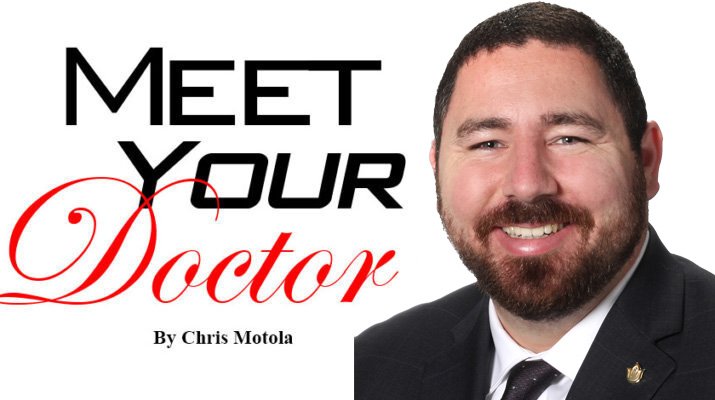Cataracts, floaters, macular degeneration, dry eyes: Optometrist at Ross Eye Institute talks about issues that can affect your vision
By Chris Motola
Q: What kinds of problems do people tend to run into with their eyes as they age?
A: I’ll start with dry eyes, which is very common and tends to increase with age. Dry eyes can cause a gritty sensation, irritation, pain. Counterintuitively it can also cause increased tearing, which has to do with the eye’s inability to retain moisture on the front surface. It’s a natural response to increase tear production. It can also cause mucus and discharge in the morning. We have many treatments for dry eyes, including topical drops, medication, plugs to prevent tear drainage and even a new FDA-approved high-pulse light therapy, which also has the added benefit of reducing wrinkles around the eyes.
Q: How does the eye lose its ability to retain moisture?
A: It’s a multifactorial condition related to age. In some patients they’re not able to produce enough tears. In other cases the tears they’re producing aren’t of a good quality. In other cases, the tear may be evaporating too quickly due to the oil glands around the eye not working as effectively, which leads to faster evaporation.
Q: What other conditions do you see with age?
A: Another common one is presbyopia, which is the eye’s inability to compensate for near work. This can occur at different stages, but it’s exacerbated by our digital devices. You may see friends or family members who wish their arms were longer because they can’t quite see their phones up close, but holding it back makes it a little bit clearer. It’s the muscles in the eyes not being able to compensate for a near target. This can usually be easily diagnosed during a comprehensive eye exam and is treated with things like bifocals, contact lens or even prescription eye drops. Surgery is generally not a treatment, which I’m mentioning because some patients ask about Lasik.
Q: This might be a stupid question, but since it’s a muscle issue, is it something you can train?
A: That’s a great question. Saying it’s a muscle issue is somewhat simplifying it. It’s both your eye’s inability to stimulate your accommodative system, but it’s also decreased flexibility in the lens of the eye itself. So unfortunately, no, it’s not something we can attempt to train, with some rare exceptions.
Q: Why is Lasik not useful here?
A: Lasik tends to be suggested for younger patients between 20 to 40 with a certain type of stable glasses prescription. It’s generally just to correct your distance vision.
Q: Cataracts are a well-known eye aging issue. What’s going on with those?
A: Cataracts are actually an aging process, not a disease. It’s the progressive cloudiness of the lens inside your eye. They cause blurs and distortions, especially at night and at all distances regardless of whether you’re wearing your glasses or not. The treatment is ultimately cataract surgery, where they replace your cloudy lens with an implant. There are several different lens options depending on your vision demands. Your eye doctor should be checking for cataracts every time you visit them and give you an idea of when the best time to consider surgery might be.
Q: How long do these replacements lens usually last?
A: They should last a lifetime unless there are complications. Once they change the window in your eye, if you want to think of it that way, that should be it.
Q: Any other conditions you want to touch on?
A: Two, actually. One is floaters. Some patients may notice them. They’re the coagulation of the jelly-like substance in the eye. As the substance changes, it can lead to temporary visual phenomena, almost like seeing bugs moving around that aren’t there. We tend to become less sensitive to the changes over time; the brain tunes most of it out. If you do notice major changes though, you should call your eye doctor as soon as possible. That, along with sudden flashes, can be a symptom of a detached retina. A retinal detachment is an injury, essentially, to the wallpaper of your eye. It captures the light and turns it into signals that can be interpreted by the brain as images. If that wallpaper gets damaged, we’re not able to capture light in a meaningful way, so making sure it’s healthy is an important part of eye exams. And the last thing I wanted to touch on is macular degeneration.
Q: What is macular degeneration?
A: This is a disease that tends to be found in the older population that reduces the clarity of your central vision. The best treatment is prevention: avoid smoking and wear sunglasses. But some macular degeneration may require interventions and increased monitoring. It’s another condition we screen for with annual eye exams, so make sure you’re being seen annually, especially over age 60.
Q: Do you have any general advice for eye health?
A: The biggest thing is not to worry too much. Let your doctor manage most of the concern. Your glasses should only help your vision. If you’re noticing they’re not helping or not helping as much, discuss it with your eye doctor. Aside from that the best thing you can do for your eyes is just take care of your overall health. Avoid smoking. If you have diabetes, or high blood pressure, getting them under control will probably help your eyes.
Lifelines
Name: Benjamin Gutsin, OD
Position: Optometrist at Ross Eye Institute and clinical instructor of ophthalmology
Hometown: Orchard Park
Education: Pennsylvania College of Optometry, doctor of optometry; specialty in contact lenses, The Eye Institute, Salus University, internship; Ophthalmology Physicians & Surgeons in Collegeville, Pennsylvania, U.S. Department of veteran Affairs, Wilmington, Delaware, internship
Family: Wife
Hobbies: Traveling, cooking, outdoor activities

